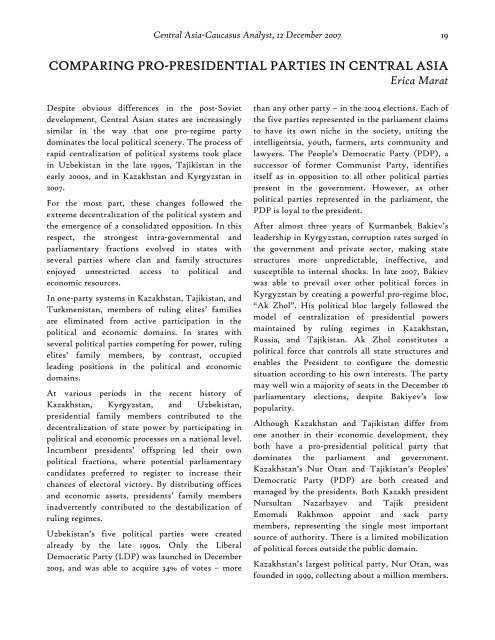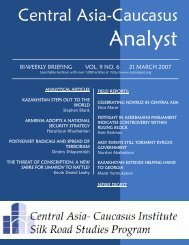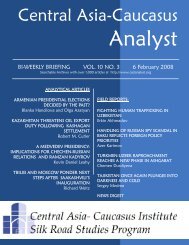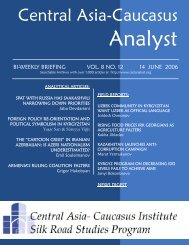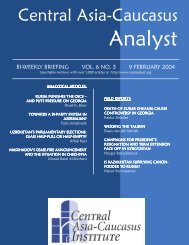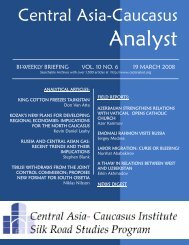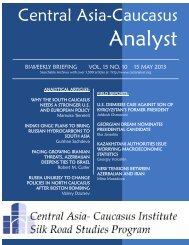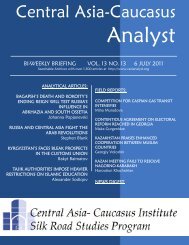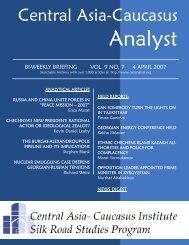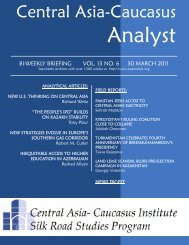18<strong>Central</strong> <strong>Asia</strong>-<strong>Caucasus</strong> <strong>Analyst</strong>, 12 December2007voluntary resignation as the Minister of Industry,Trade and Tourism in April 2006 in protest againstthe family rule, surge of criminals, and abandonedconstitutional reforms, was one of the vociferousrally leaders in November 2006 that forced Bakievto endorse a pro-parliament Constitution. <strong>The</strong>crowd long remembered his harsh rhetoric, labelingBakiev as a “political corpse” for his stubbornness toadopt constitutional reforms.In the meantime, the newly appointed First DeputyPrime Minister, Iskender Aidaraliev, one of theclosest loyalists of the president, leads the cabinet.A native of Talas oblast, he was appointedgovernor of Jalalabad oblast, Bakiev’s birthplace, ayear ago and stayed close with the President’sbrother, Akmat Bakiev, who is said to have stronginfluence over administrative resources and cadrematters in the oblast. Although commandingpopular support among grassroots, previousgovernor Jusupjan Jeenbekov, now a top member ofthe SDPK, left the office, reportedly after havingstern encounters with the president’s family.Currently, a little known local government official,Koshbai Masirov, became the new governor ofJalalabad oblast.On November 27, the President also dismissed thepopular governor of Osh oblast, JantoroSatybaldiev, who was allegedly involved in“financial machinations.” Satybaldiev himselfrejects official accusations that he caused a loss ofUS$50,000 to the state budget. According to EdilBaisalov, spokesman of SDPK, “Satybaldiev wasready to resign and to be in the top list of SDPKcandidates, but the government warned him not todo it if he wanted to work as a governor until 2010.Appointed as Governor of Osh in 2006, hemaintained a more opposition-oriented outlook, andsought an expanded decision-making role forregional authorities. <strong>The</strong> new governor of Oshoblast is Aaly Karashev, who worked as an officerin the president’s administration.<strong>The</strong> Social Democrats have suffered from furtheraccusations. <strong>The</strong> <strong>Central</strong> Election Commission(CEC) accused Baysalov of disclosing secret stateinformation after he posted a picture of the ballotpaper on his website. He was taken off the electionrace. <strong>The</strong> CEC is now filing a lawsuit againstSDPK to force the party to compensate for theballots that were eventually discarded, estimatingthe damage at some US$590,000. Some members ofthe CEC demand that the SDPK be removed fromthe ballot. Baysalov in turn argues that the CEC isconduting an effort to overshadow all the flaws ofthe ballots – which were made of the lowest qualitypaper – and find a scapegoat.As Atambaev is currently technically neitherleading the government nor his party, there is apossibility that SDP, with its key members out ofrace, may enjoy lower support in the elections.Along with these strategic replacements, which helphim secure control during the elections, PresidentBakiev appointed Ishengul Boljurova as Minister ofEducation and Science. <strong>The</strong> manipulation ofstudents brings a pool of easy votes, a successfulpractice inherited by the previous regime.<strong>The</strong> president’s recent move to staff thegovernment with low-profile officials willcertainly eliminate all unpredictable outcomesand bring about desired results in the election.Election results will likely be contested, since atleast three parties are expecting to win amajority of votes in the parliament. However,as more disappointed high-profile politiciansfind themselves out of power, in contrast to AkJol party that instead harbors little knownpeople, the risk of political turbulence istangible. <strong>The</strong>refore, Bakiev would be advised towatch his political steps, which have becameboisterous and confident, not to spark up thekind of popular anger that his predecessorAskar Akaev once did.
<strong>Central</strong> <strong>Asia</strong>-<strong>Caucasus</strong> <strong>Analyst</strong>, 12 December 2007 19COMPARING PRO-PRESIDENTIAL PARTIES IN CENTRAL ASIAErica MaratDespite obvious differences in the post-Sovietdevelopment, <strong>Central</strong> <strong>Asia</strong>n states are increasinglysimilar in the way that one pro-regime partydominates the local political scenery. <strong>The</strong> process ofrapid centralization of political systems took placein Uzbekistan in the late 1990s, Tajikistan in theearly 2000s, and in Kazakhstan and Kyrgyzstan in2007.For the most part, these changes followed theextreme decentralization of the political system andthe emergence of a consolidated opposition. In thisrespect, the strongest intra-governmental andparliamentary fractions evolved in states withseveral parties where clan and family structuresenjoyed unrestricted access to political andeconomic resources.In one-party systems in Kazakhstan, Tajikistan, andTurkmenistan, members of ruling elites’ familiesare eliminated from active participation in thepolitical and economic domains. In states withseveral political parties competing for power, rulingelites’ family members, by contrast, occupiedleading positions in the political and economicdomains.At various periods in the recent history ofKazakhstan, Kyrgyzstan, and Uzbekistan,presidential family members contributed to thedecentralization of state power by participating inpolitical and economic processes on a national level.Incumbent presidents’ offspring led their ownpolitical fractions, where potential parliamentarycandidates preferred to register to increase theirchances of electoral victory. By distributing officesand economic assets, presidents’ family membersinadvertently contributed to the destabilization ofruling regimes.Uzbekistan’s five political parties were createdalready by the late 1990s. Only the LiberalDemocratic Party (LDP) was launched in December2003, and was able to acquire 34% of votes – morethan any other party – in the 2004 elections. Each ofthe five parties represented in the parliament claimsto have its own niche in the society, uniting theintelligentsia, youth, farmers, arts community andlawyers. <strong>The</strong> People’s Democratic Party (PDP), asuccessor of former Communist Party, identifiesitself as in opposition to all other political partiespresent in the government. However, as otherpolitical parties represented in the parliament, thePDP is loyal to the president.After almost three years of Kurmanbek Bakiev’sleadership in Kyrgyzstan, corruption rates surged inthe government and private sector, making statestructures more unpredictable, ineffective, andsusceptible to internal shocks. In late 2007, Bakievwas able to prevail over other political forces inKyrgyzstan by creating a powerful pro-regime bloc,“Ak Zhol”. His political bloc largely followed themodel of centralization of presidential powersmaintained by ruling regimes in Kazakhstan,Russia, and Tajikistan. Ak Zhol constitutes apolitical force that controls all state structures andenables the President to configure the domesticsituation according to his own interests. <strong>The</strong> partymay well win a majority of seats in the December 16parliamentary elections, despite Bakiyev’s lowpopularity.Although Kazakhstan and Tajikistan differ fromone another in their economic development, theyboth have a pro-presidential political party thatdominates the parliament and government.Kazakhstan’s Nur Otan and Tajikistan’s Peoples’Democratic Party (PDP) are both created andmanaged by the presidents. Both Kazakh presidentNursultan Nazarbayev and Tajik presidentEmomali Rakhmon appoint and sack partymembers, representing the single most importantsource of authority. <strong>The</strong>re is a limited mobilizationof political forces outside the public domain.Kazakhstan’s largest political party, Nur Otan, wasfounded in 1999, collecting about a million members.
- Page 1: Central Asia-CaucasusAnalystBI-WEEK
- Page 4 and 5: THE CENTRAL ASIA-CAUCASUS ANALYSTEd
- Page 6 and 7: 4Central Asia-Caucasus Analyst, 12
- Page 8 and 9: 6Central Asia-Caucasus Analyst, 12
- Page 10 and 11: 8Central Asia-Caucasus Analyst, 12
- Page 12 and 13: 10Central Asia-Caucasus Analyst, 12
- Page 14 and 15: 12Central Asia-Caucasus Analyst, 12
- Page 16 and 17: 14Central Asia-Caucasus Analyst, 12
- Page 18 and 19: 16Central Asia-Caucasus Analyst, 12
- Page 22 and 23: 20Central Asia-Caucasus Analyst, 12
- Page 24 and 25: 22Central Asia-Caucasus Analyst, 12
- Page 26 and 27: 24Central Asia-Caucasus Analyst, 12
- Page 28 and 29: 26Central Asia-Caucasus Analyst, 12
- Page 30: 28Central Asia-Caucasus Analyst, 12


